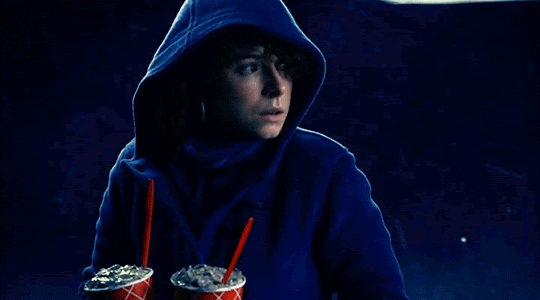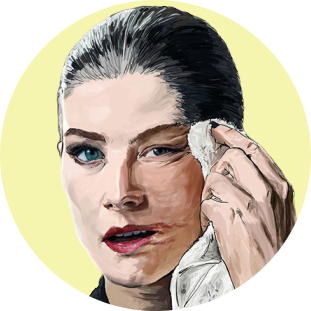V entura! You said you were going to write in this blog! You said the lack of content due to COVID-19 was not going to be an excuse! Where is the third entry on that Nicole Kidman filmography thingy you still need to finish? WELL, I LIED. I'm an unrealiable narrator, remember?
I will finish the Nicole Kidman filmography thingy, I promise, but for now, CHARLIE KAUFMAN IS BACK, BITCHES! I so wanted to write about his new film, I'm Thinking of Ending Things, partly because my only review so far has been about the Eurovision Neflix film, which was... not great. But then I saw it and I was like: Girl! What on the fuck is going on here?
Sooo, I thought about it, and since I've been doing a Kaufman marathon of sorts to prepare for its release, I've decided a raking of his work is much more on my wheelhouse: something overlong no one will read. Let's get started!
I won't lie to you, Bryn. I hates it. I mean, I don't hate it, but it's depressing as hell, and the animation style is kinda uncanny valley-esque. It's a good place to say I much prefer Kaufman the writer than Kaufman the director, so far. Not because there's anything wrong with his directing style, but because I favour her early work. Anomalisa is ingenious, and has plenty to like, but even claymation can't help this project being the one I came out of the most willing to forget.

The beginning of Kaufman's difficulties when selling a script, Synecdoche, New York can be frustrating as all hell, and is the first of Kaufman's uneven directorial efforts. But within the trap that the writer-director sets up for himself (a never-ending project hell-bent on realism that will never pay-off) there is a certain charm that originates from the real relationships of the actors tasked with the unfathomable project. It doesn't entirely work, but it feels personal and sad in a way that doesn't leave you hollow. Also, Philip Seymour Hoffman is always a reason to watch, and Emily Watson and Samantha Morton's uncanny resemblance is a funny touch.
4º. I'M THINKING OF ENDING THINGS (2020)
Okay! So, did I know what was going on most of the time? No. But girl, I was living! I watched this yesterday with my sister, after a mid-afternoon Eternal Sunshine rewatch, and she hated it, with intensity. I can see Kaufman was aiming to be frustrating, and he both succeeds (it is frustrating) and fails to make something with some sort of emotional resonance, which is what's usually best about his clever and twisted scripts. So much so, that the success of this film for me could vary from scene to scene, as my opinion on it hung on how much I enjoyed to be wagged around by Kaufman. The end is a whole trip, and I'll have to read the book to really know what the hell I was supposed to understand, but I did enjoy those long, stretched, (for some) boring, conversations, partly because I like Buckley and Plemmons so much, and they're the kind of interesting actors who can pull them off. It isn't a film that will stay with me in an emotional way, but I finished it and decided I had enjoyed it, and so the trip in the dark was worth it.
Listen, you write a film, Meryl Streep is cast in it, and she's unable to destroy it; that's a straight four-and-a-half stars from me, I don't care. This screenplay is air-tight. I won't go into a deep analysis of how Meh fails in this (and every other) film, but the real reason to love this project is Nicolas Cage as a Kaufman-esque verion of Charlie Kaufman, trapped between extreem self-hate and self-indulgence, who turned a book adaptation of The Orchid Thief into the telling of a midlife crisis he was stuck in while dealing with writer's block, paired with a Hollywood-demanded ending filled with violence and pathos. This is Kaufman going all the way to the brink of obsession, doing a film mostly about a depressed, middle-aged man who masturbates and sweats excessively, then being able to pull back from the brink to deliver something resembling a normal story, which hasn't always been the case.
This was, until yesterday, my favorite Charlie Kaufman film, a way of putting it which isn't fair to his collaboration with Spike Jonze, with whom he also did Adaptation. Their styles gel, and the results are usually electrifying, but never more than in Being John Malkovich. The premise itself is weird as hell, and so in line with Kaufman's weird brand of story-within-the-mind madness, but the way it's executed and the places it dares to go to (especially towards the end) marks the beginning of Kaufman's no-fucks-given reign. Plus, Catherine Keener and Cameron Diaz DELIVER.
1º. ETERNAL SUNSHINE OF THE SPOTLESS MIND (2004)
"What do we do?" "Enjoy it."
Kaufman cinematic perfection. I rewatched this yesterday, before I'm Thinking of Ending Things, because the first time I saw it, I was too young, and sick and it ended and I was like WTF? And boy, it did not disappoint this time around. Charlie Kaufman is at his best when he manages to pair his excentricty and twisty scripts with a core rooted in human emotion, which, even within its depressing tone, Eternal Sunshine of the Spotless Mind has pools of. Kate Winslet delivers here some of her more insteresting work, but it's also further proof that Jim Carrey can do ANYTHING, comedy or drama, and was wronged by the Academy both with this and The Truman Show.
My main problem with it, the first time, was simply that I didn't understand its going-backwards structure, which seemed much easier to follow now. Once that is out of the way, the characters, their relationships and stories take central stage, and a certain sweet sadness takes over as it approaches its emotional gut-punch of an ending. Are Joel and Celementine wrong for each other? Are they doomed to make the same mistakes over and over, like Mary and Dr. Howard? Is their happiness together a ephemeral sunshine only possible when the slate is clean, when the mind is spotless?
We don't know, and neither do them, but by the end of their backwards journey down memory lane, they've decided to try again, and again, because there's nothing they can think of they don't like about each other, nothing they'll get bored of. And as I fought the tears after listening to both say hurtful things of one another, knowing that's where they could be headed to again, I thought that hope was beautiful.
And so here it ends! With a film that's smart, complicated, sad, hurtful, weird and crazy, like the best of Kaufman's are. I think, within his journey as a writer-director, I'm Thinking of Ending Things was a step in the right direction, maybe not his strongest in terms of threading that craziness together with emotion, but his most confident directorial effort so far.
As of today, Kaufman seems to be thriving again (or getting back into employment, which he has struggled with for many years, as his once-promising unmade projects can attest). He is working on two new scripts: an adaptation of The Memory Police, a 1994 novel by Yoko Ogawa, which I'll be reading shortly after I finish Dune (sigh) and I'm Thinking of Ending Things, and an HBO miniseries based on IQ 83, an Arthur Herzog 1978 novel about a virus that causes stupidity (so, like Coronavirus).
Both sound interesting and continue to explore his mind-obsessed niche, and I can't wait to see what he does with them now that Netflix's bottomless pockets seem to have taken an interest with him and the world is re-awakening to his particular brand of excellence. Maybe we'll be getting a Kaufman musical one day, who knows, but I'm sure it will be totally unique and completely-not-ever-been-done-before.






















